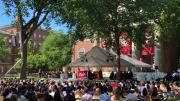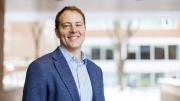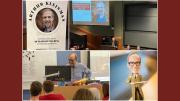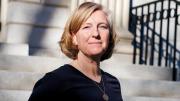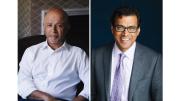On Tuesday afternoon, at Freshman Convocation, Harvard College’s newest incoming class was welcomed with a mixture of good wishes and stiff warnings, drawn in part from the troubled national politics of today. It was the first back-to-normal Convocation since the beginning of the pandemic (last year’s event welcomed two classes at once) and the final one for President Lawrence S. Bacow, who earlier this summer announced that he would retire at the end of the 2022-23 school year.
After first-year students, in suits and dresses, lined up and processed into the Yard, speaker after speaker urged them toward new adventures and urgent transformations—of themselves and the world they will inherit. Speakers reminded first-years to forgive imperfections in themselves and others, to push beyond the limits of their own comfort, and explore the edges of their own knowledge. To ask questions. To be humble enough to wait for the answers. This year’s incoming class includes record-high ratios of women, Asian Americans, and Native American and Hawaiian students. First-generation college students make up a record 19.4 percent of the enrolling freshman.
Early on in the program, College dean of students Katherine O’Dair offered the reassurance that every freshman class receives (and perhaps needs): “You belong here,” she said. “This is your home, your community.”
In a speech that was at times sternly emotional, Harvard College Dean Rakesh Khurana pushed students not to take the easy path during their four years in Cambridge. “I want to urge you to think seriously about why you’re here,” he said. “You’ve arrived at a difficult moment in our nation’s—and indeed our world’s—history, with the question of who we are, who we thought we were, and who we’re going to be, all in play.” Warning of difficult choices ahead for them, and the importance of the search for truth—“Veritas is more than just a slogan”—Khurana condemned conformity and “comfortable lies.” He noted the University’s recently released report that uncovered, in copious and painful detail, its historical ties to slavery and racial oppression. He quoted the inscription on the Yard’s Dexter gate: “Enter to grow in wisdom.” To grow in wisdom, he said, “we need to recognize that we don’t know everything. We need to appreciate our imperfections, our fallibility, and acknowledge that we are error-prone, and that human beings can hold onto a serious error for a very, very long time. It’s not easy to approach the world with questions rather than answers.” But it is important, Khurana insisted, to do so.
And, he added, to begin doing so right away: “To see Harvard as another four years of building your resume while your life is on hold is to miss out on the best of what this institution has to offer, and the best of what you can contribute. College is not a stop on the way to the rest of your life. This is your life. … If you spent four years taking no chances, reinforcing your beliefs, deferring any reflection on you who you are and what you want, you will be doing the same thing in 20 years.” In the brokenness of the current world, “there’s so much work to be done,” he said. But “the only way we can begin to change the world is if we are open to change ourselves.” He closed with a few lines from “Making Mountains as We Run,” the poem Amanda Gorman ’20 wrote and presented at Bacow’s inauguration in 2017. Meditating on many of the same ideas as Khurana, Gorman had offered an imagined roll call of vivid definitions for Harvard’s motto. Veritas, she wrote, “meaning we can shape the sea as we sail / And the only way to fail is to not learn from the journey, / And the only way to triumph is to share what we know to be true.”
projecting warmth and geniality, Bacow came to the podium with much the same message. First, he told a story about his own freshman year 53 years ago, and his first college roommate, a man named Alan, with whom the young Bacow seemed to have nothing in common: cleanliness, study habits, musical taste, politics. “I said to myself, ‘This is not going to work.’” But of course, it did, and five decades later, the two men and their families are close friends. Alan even introduced Bacow to his wife. “We’ve been through, candidly, all of life’s passages together...the sweetness of every milestone, and the sorrow of every loss.”
The message in his story, he said, was this: “Please don’t overlook your Alan. Please don’t judge people quickly based on their outward appearances or your first impressions. One of the many reasons we admitted students from around the world, people with every interest imaginable, is because we learn from our differences. As you get to know your roommates and your classmates, try to be slow to judge and quick to understand. Give everyone the benefit of the doubt, at least initially, not just at Harvard but throughout life and you will be surprised by the number of friends you will acquire, people quite different from you, but people who will enrich your life immensely.”
At the same time, Bacow acknowledged, “You may meet people at Harvard that you do not like. Harvard is a microcosm of the larger world, and everything that you may find objectionable in the larger world is present in some measure here. We are not perfect, but we strive to be better.” Returning to the idea of Veritas, he added, “It is the reason we exist, to seek the truth. Over time, truth is revealed; it needs to be tested on the anvil of competing ideas. If you really seek the truth, you must engage with those who think differently than you. Even more importantly, you must be willing to change your mind—to be persuaded by a better argument or new information. Only when you have this experience will you be well equipped to make a difference in the world.”
Finally, Bacow, who witnessed more than a few tearful goodbyes last week while helping students move into the dorms, ended on a note closer to the ground, and to the heart: don’t forget to call home, he told students. “Most of you have been at the center of your loved one’s lives since the day you entered their world,” he said. “They are also going through a big adjustment, and it is up to you to help them through it.”
